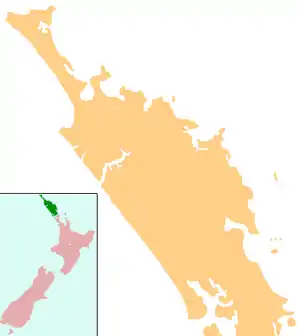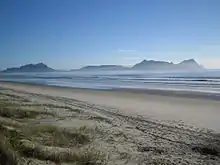Ruakākā
Ruakākā is a small town in the north of New Zealand approximately 30 kilometres south of Whangārei in the Bream Bay area. Originally a small beachside community, Ruakākā has seen development due to its proximity to the expansion of the country's only oil refinery at Marsden Point during the 1980s. A recently established timber processing plant at Marsden Point has further stimulated growth.[2]
Ruakākā | |
|---|---|
 Seal | |
 Ruakākā | |
| Coordinates: 35°54′30.1″S 174°27′34.47″E | |
| Country | New Zealand |
| Region | Northland |
| Territorial Authority | Whangarei District |
| Pre 1989 | Whangarei County |
| Government | |
| • Mayor | Sheryl Mai |
| Population (June 2020)[1] | |
| • Total | 2,830 |
| Time zone | UTC+12 (NZST) |
| • Summer (DST) | UTC+13 (NZDT) |
| Website | http://www.ruakaka.co.nz |
Geography
Naming
The name Ruakākā is a combination of the two words rua and kākā; rua being a Māori word for "nest" or "two", and kākā being the name of a native parrot (Nestor meridionalis).[3] Ruakākā was usually spelled as "Ruakaka" without macrons until the official name was changed in 2019.[4]
Districts
The general area is made up of Ruakākā Beach, Ruakākā Township and Marsden Point. Other Bream Bay localities such as One Tree Point, Takahiwai and even Waipu are often included in general conversation regarding the area.

Ruakākā Beach lies near the mouth of the Ruakākā River which boasts a rare bird reserve and popular holiday parks. It is primarily a residential area made up of a mixture of permanent homes and beach shacks.
The Ruakākā Township was developed off the back of the Marsden Point Oil Refinery expansion in the 1980s where services were required to support the large influx of workers from all over the world involved in the project. A government requirement for a percentage of revenue invested in the project to be spent on the local community allowed for provision of services not common in communities this size (e.g. squash courts, sports grounds).
The Marsden Power Station Village was built to support the Marsden Power Stations (A & B) which have since been decommissioned. The area is now promoted as beachside living.
Beaches
The bay has beautiful sandy white beaches looking out towards Bream Head, the Hen and Chicken Islands, Mount Manaia and Sail Rock.
Demographics
| Year | Pop. | ±% p.a. |
|---|---|---|
| 2006 | 1,917 | — |
| 2013 | 2,007 | +0.66% |
| 2018 | 2,586 | +5.20% |
| Source: [5] | ||
The statistical area of Ruakaka, which includes Marsden Village to the north, had a population of 2,586 at the 2018 New Zealand census, an increase of 579 people (28.8%) since the 2013 census, and an increase of 669 people (34.9%) since the 2006 census. There were 960 households. There were 1,281 males and 1,302 females, giving a sex ratio of 0.98 males per female. Of the total population, 525 people (20.3%) were aged up to 15 years, 420 (16.2%) were 15 to 29, 1,101 (42.6%) were 30 to 64, and 543 (21.0%) were 65 or older. Figures may not add up to the total due to rounding.
Ethnicities were 77.7% European/Pākehā, 33.9% Māori, 4.8% Pacific peoples, 3.6% Asian, and 0.8% other ethnicities. People may identify with more than one ethnicity.
The percentage of people born overseas was 15.2, compared with 27.1% nationally.
Although some people objected to giving their religion, 54.4% had no religion, 32.1% were Christian, and 5.8% had other religions.
Of those at least 15 years old, 267 (13.0%) people had a bachelor or higher degree, and 498 (24.2%) people had no formal qualifications. The median income was $26,000. The employment status of those at least 15 was that 870 (42.2%) people were employed full-time, 291 (14.1%) were part-time, and 87 (4.2%) were unemployed.[5]
Climate
The region's geographical location results in warm humid summers and mild winters. Typical summer temperatures range from 22 °C to 26 °C (72 °F to 79 °F), some of the warmest in the country. Ground frosts are virtually unknown. The hottest months are January and February. Typical annual rainfall for the region is 1500 – 2000 mm. Winds year-round are predominantly from the southwest. Ruakākā has a warm version of the oceanic climate[6] closely bordering on humid subtropical, a typical feature of Northland's climate.
| Climate data for Ruakākā | |||||||||||||
|---|---|---|---|---|---|---|---|---|---|---|---|---|---|
| Month | Jan | Feb | Mar | Apr | May | Jun | Jul | Aug | Sep | Oct | Nov | Dec | Year |
| Average high °C (°F) | 24.9 (76.8) |
24.8 (76.6) |
23.7 (74.7) |
21.1 (70.0) |
18.9 (66.0) |
16.6 (61.9) |
15.6 (60.1) |
16.2 (61.2) |
17.6 (63.7) |
19.5 (67.1) |
21.0 (69.8) |
23.4 (74.1) |
20.3 (68.5) |
| Daily mean °C (°F) | 20.1 (68.2) |
20.4 (68.7) |
19.2 (66.6) |
17.2 (63.0) |
14.9 (58.8) |
12.4 (54.3) |
11.8 (53.2) |
12.3 (54.1) |
13.6 (56.5) |
15.2 (59.4) |
16.5 (61.7) |
18.7 (65.7) |
16.0 (60.8) |
| Average low °C (°F) | 15.3 (59.5) |
15.9 (60.6) |
14.7 (58.5) |
13.3 (55.9) |
10.8 (51.4) |
8.2 (46.8) |
7.9 (46.2) |
8.4 (47.1) |
9.5 (49.1) |
10.9 (51.6) |
11.9 (53.4) |
14.0 (57.2) |
11.7 (53.1) |
| Source: [7] | |||||||||||||
History
The area of Ruakākā is located in Bream Bay which was named by Captain Cook during his first voyage to New Zealand when he visited the region on 25 November 1769. It was named due to the ease of capture of 90–100 bream fish soon after anchoring.
Education
Bream Bay College is a secondary (years 7–13) school with a roll of 457.[8]
Ruakākā School is a contributing primary (years 1–6) school. It has a roll of 127.[9]
Both schools are coeducational and have a decile rating of 4.
Ruakākā School opened in 1898 in North Ruakākā. Until 1916 it was a half-time school sharing a teacher with Mata School. The school moved to its present site in 1912. Bream Bay College started in 1972 as a Forms 3–7 (years 9–13) school on the site of Waipu District High School. It moved to Ruakākā in February 1974 and expanded to include Forms 1 and 2 (years 7–8).[10][11]
Attractions and landmarks
The following is a list of tourist attractions and landmarks in the Ruakākā Local Area.
- Ruakaka Race Course
- New Zealand Oil Refinery Visitors Centre
Railway proposal
A branch line railway to Marsden Point from Oakleigh on the North Auckland Line has recently been proposed. This Marsden Point Branch will primarily serve freight interests, but the Northland Regional Land Transport Committee has suggested that passenger trains for commuters between Ruakākā and Whangarei are a long-term option.[12]
References
- "Population estimate tables - NZ.Stat". Statistics New Zealand. Retrieved 22 October 2020.
- "Forestry and Wood Processing". Enterprise Northland.
- Discover New Zealand: A Wise's Guide (9 ed.). 1994. p. 62.
- "Ruakākā". NZGB Gazetteer | linz.govt.nz. Retrieved 27 April 2020.
- "Statistical area 1 dataset for 2018 Census". Statistics New Zealand. March 2020. Ruakaka (108800). 2018 Census place summary: Ruakākā
- "Ruakaka, New Zealand Climate Summary". Weatherbase. Retrieved 6 February 2015.
- "Ruakaka, New Zealand Temperature Averages". Weatherbase. Retrieved 6 February 2015.
- "Te Kete Ipurangi – Bream Bay College". Ministry of Education. Archived from the original on 13 September 2012.
- "Te Kete Ipurangi – Ruakaka School". Ministry of Education. Archived from the original on 14 September 2012.
- Richards, Judy (1984). Ruakaka (A Brief History). pp. 77–80, 84.
- Gordon, Charles MacNeill (Mac) (2002). "Education Always a Priority". Pride of the Lion: Waipu – the People and the Place. pp. 209–221. ISBN 0-473-08890-8.
- "All aboard for Ruakaka", Whangarei Leader, 21 February 2006.